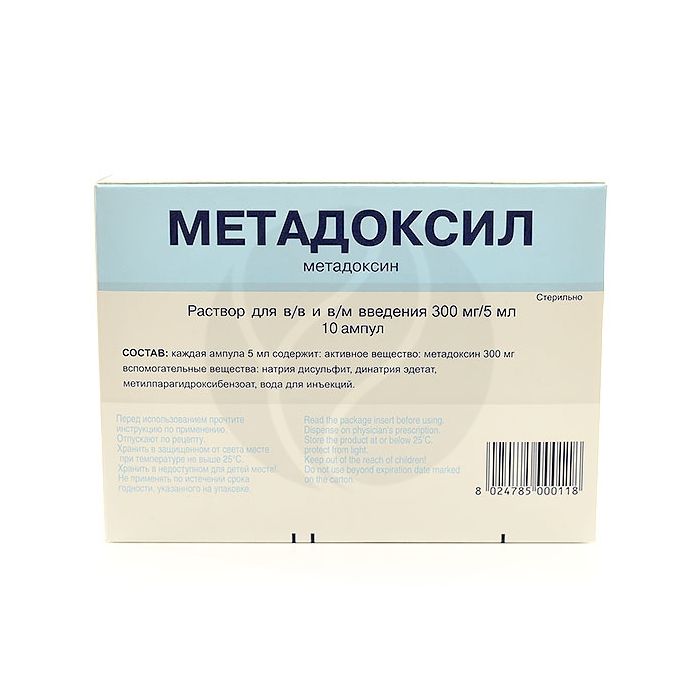Metadoxil solution for injection 300mg / ml, 5 ml No. 10
Expiration Date: 05/2027
Russian Pharmacy name:
Метадоксил раствор для инъекций 300мг/мл, 5 мл №10
acute alcohol intoxication
alcohol withdrawal syndrome
chronic alcoholism
complex therapy of liver diseases, especially alcoholic etiology
Acute alcohol intoxication: 300-600 mg (5-10 ml) intramuscularly or 300-900 mg (5-15 ml) intravenously, depending on the degree of intoxication. For intravenous administration, the required dose of the drug is diluted in 500 ml of isotonic sodium chloride solution or 5% dextrose (glucose) solution and injected drip for 1.5 hours.
Alcohol withdrawal syndrome: 900 mg (15 ml) as an intravenous infusion (see above) once a day for 3-7 days, depending on the patient's condition.
One ampoule 5 ml contains:
Active ingredient: Metadoxine (pyridoxine L-2 pyrrolidone 5-carboxylate) - 300 mg
Inactive ingredients: sodium metabisulfite, sodium edetate, methyl p-hydroxybenzoate, water for injection.
hypersensitivity to any component of the drug
lactation period
period of pregnancy
With caution
Use with caution in Parkinson's disease if levodopa is used concomitantly. metadoxine reduces the effectiveness of the drug.
Ampoules of solution for injection contain sodium metabisulfite. This substance can cause allergic reactions or increased asthma attacks in susceptible people, especially those with bronchial asthma.
Trade name: METADOXIL
Dosage form:
injection
Composition
One ampoule 5 ml contains:
Active substance: Metadoxine (pyridoxine L-2 pyrrolidone 5-carboxylate) - 300 mg
Inactive ingredients: sodium metabisulfite, sodium edetate, methyl p-hydroxybenzoate, water for injection.
Description
Ampoules: yellow glass ampoules containing a clear, colorless or slightly yellowish liquid.
Pharmacotherapeutic group:
remedy for the treatment of alcoholism.
ATX code: V03AA.
Pharmacological properties
The hepatoprotective effect of metadoxin is due to the membrane stabilizing effect and is based on the ability to restore the ratio of saturated and unsaturated free fatty acids. As a result, the resistance of hepatocytes to the action of lipid peroxidation, which occurs when exposed to various toxic agents, increases. The detoxification effect of metadoxin is due to the activation of liver enzymes involved in the metabolism of ethanol - alcohol dehydrogenase and acetaldehyde dehydrogenase, which accelerates the process of removing ethanol and acetaldehyde from the body, and, consequently, their toxic effects are reduced.
Metadoxin prevents the accumulation of triglycerides in hepatocytes, and also prevents the formation of fibronectin and collagen, which significantly slows down the formation of liver cirrhosis.
The drug reduces the mental and somatic manifestations of the hangover syndrome, reduces the time for relief of withdrawal symptoms.
Metadoxin activates the cholinergic and GABA-ergic neurotransmitter systems, improves the functions of thinking and short memory, and prevents the occurrence of motor excitement, which is caused by ethanol.
Metadoxine has a nonspecific antidepressant and anxiolytic effect, reduces the craving for alcohol.
Pharmacokinetics
The drug is rapidly absorbed from the gastrointestinal tract and has a high bioavailability (60-80%). Communication with plasma proteins - 50%. It is metabolized in the liver to active metabolites - pyridine and pyrrolidone carboxylate. The half-life (T?) For oral or parenteral administration is 40-60 minutes. 45 - 50% of the drug is excreted in the urine within 24 hours, 35 - 50% of the drug is excreted in the feces within 96 hours.
Indications for use
acute alcohol intoxication
alcohol withdrawal syndrome
chronic alcoholism
complex therapy of liver diseases, especially alcoholic etiology
Contraindications
hypersensitivity to any component of the drug
lactation period
period of pregnancy
Carefully
Use with caution in Parkinson's disease if levodopa is used concomitantly. metadoxine reduces the effectiveness of the drug.
Ampoules of solution for injection contain sodium metabisulfite. This substance can cause allergic reactions or increased asthma attacks in susceptible people, especially those with bronchial asthma.
Application during pregnancy and breastfeeding
The use of the drug during pregnancy and lactation is not recommended.
Method of administration and dosage
Acute alcohol intoxication: 300-600 mg (5-10 ml) intramuscularly or 300-900 mg (5-15 ml) intravenously, depending on the degree of intoxication. For intravenous administration, the required dose of the drug is diluted in 500 ml of isotonic sodium chloride solution or 5% dextrose (glucose) solution and injected drip for 1.5 hours.
Alcohol withdrawal syndrome: 900 mg (15 ml) as an intravenous infusion (see above) once a day for 3-7 days, depending on the patient's condition.
Side effect
Allergic reactions.
In patients suffering from bronchial asthma, the development of bronchospasm is possible (when using the dosage form - solution for injection).
Overdose symptoms and treatment methods
Not known
Interaction with other medicinal products
When used together, it reduces the effectiveness of levodopa.
Release form
Solution for injection: 5 ml in dark glass ampoules, 10 ampoules together with instructions for use in a cardboard box.
Storage conditions
In a dark place at a temperature not exceeding 25 ? C.
Keep out of the reach of children!
Shelf life
5 years. Do not use after the expiration date printed on the packaging.
Terms of dispensing from pharmacies:
On prescription

